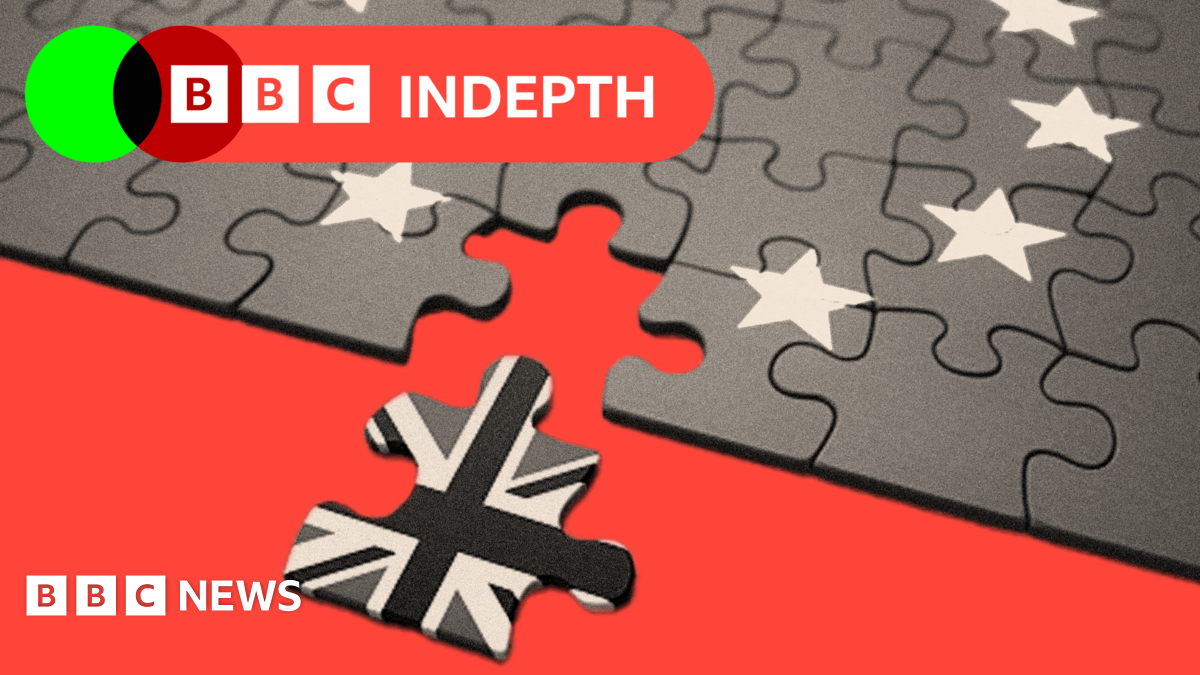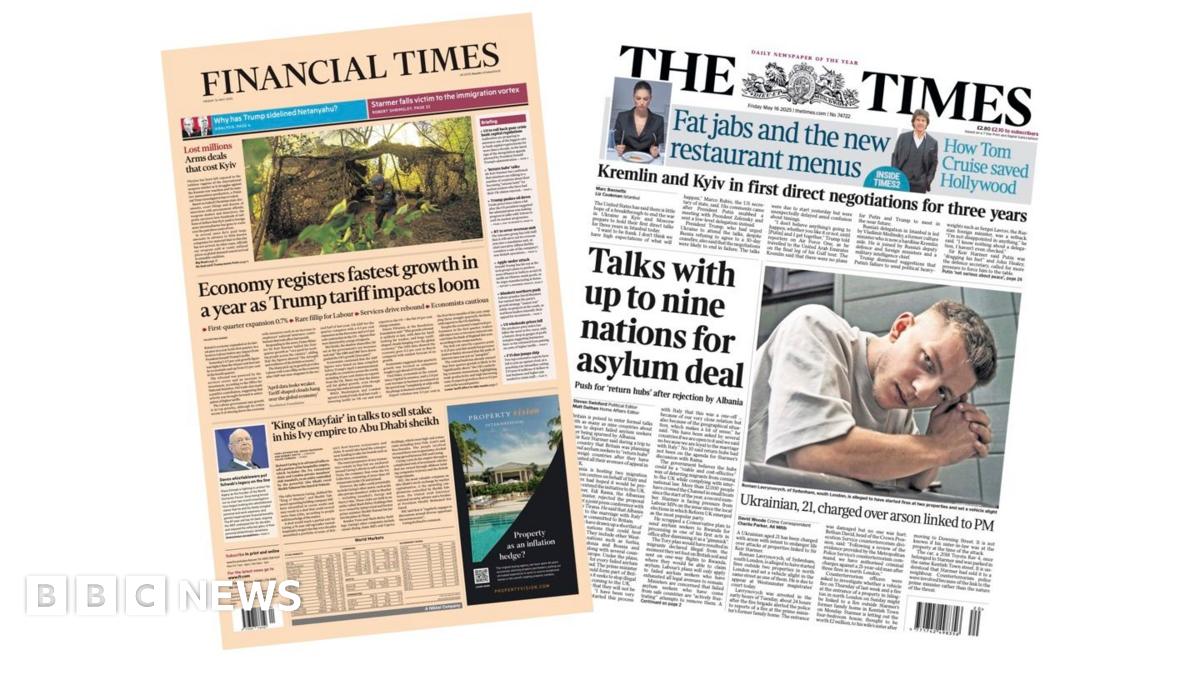Closer Ties With The EU? Analyzing Britain's Post-Brexit Approach

Welcome to your ultimate source for breaking news, trending updates, and in-depth stories from around the world. Whether it's politics, technology, entertainment, sports, or lifestyle, we bring you real-time updates that keep you informed and ahead of the curve.
Our team works tirelessly to ensure you never miss a moment. From the latest developments in global events to the most talked-about topics on social media, our news platform is designed to deliver accurate and timely information, all in one place.
Stay in the know and join thousands of readers who trust us for reliable, up-to-date content. Explore our expertly curated articles and dive deeper into the stories that matter to you. Visit Best Website now and be part of the conversation. Don't miss out on the headlines that shape our world!
Table of Contents
Closer Ties with the EU? Analyzing Britain's Post-Brexit Approach
Brexit, the UK's departure from the European Union, concluded in January 2020, leaving behind a complex legacy and sparking ongoing debate about the future relationship between the two entities. While the initial rhetoric emphasized a clean break, recent developments suggest a shift towards closer collaboration, albeit a nuanced and cautious one. This article analyzes Britain's evolving post-Brexit approach and explores the potential for a deeper, albeit different, partnership with the EU.
The Initial Phase: A Focus on Sovereignty
The immediate aftermath of Brexit saw the UK government prioritize asserting its newfound sovereignty. Negotiations were fraught with tension, culminating in a trade deal that, while avoiding a no-deal scenario, also established significant regulatory divergence. This period was characterized by:
- Focus on independent trade deals: The UK actively pursued bilateral trade agreements with countries outside the EU, aiming to demonstrate its ability to forge its own economic path.
- Emphasis on regulatory divergence: The government signaled its intent to diverge from EU regulations, viewing this as crucial for regaining control over its domestic laws.
- Friction over the Northern Ireland Protocol: The complex issue of the Northern Ireland Protocol, designed to avoid a hard border on the island of Ireland, created ongoing friction and political challenges.
A Shift in Approach? Signs of Pragmatism
However, the initial optimism surrounding independent trade deals and regulatory freedom has been tempered by economic realities. The impact of Brexit on trade flows and the complexities of navigating new regulatory landscapes have led to a more pragmatic approach from the UK government. This shift is evidenced by:
- Increased dialogue with the EU: Despite lingering disagreements, there's been a noticeable increase in high-level discussions and attempts to find solutions to outstanding issues, particularly regarding the Northern Ireland Protocol.
- Focus on specific areas of cooperation: The UK and EU have identified areas of mutual interest where closer cooperation is beneficial, including security, research, and combating climate change.
- Recognition of economic interdependence: The UK's economy remains deeply intertwined with the EU's, and this reality is increasingly acknowledged by policymakers.
Challenges and Opportunities for Closer Ties
While a closer relationship seems increasingly likely, significant hurdles remain. These include:
- Regulatory divergence: Maintaining a degree of regulatory independence remains a key priority for the UK, which complicates deeper economic integration.
- The Northern Ireland Protocol: Resolving the ongoing issues related to the Northern Ireland Protocol remains a crucial prerequisite for significant progress in the overall relationship.
- Political will: The political landscape in both the UK and the EU continues to evolve, impacting the willingness and ability to compromise and build a stronger partnership.
The Path Ahead: A New Kind of Partnership?
The future relationship between the UK and the EU remains uncertain. However, the evidence suggests a move away from the initial hardline stance toward a more pragmatic approach. This could lead to a new form of partnership, characterized by selective cooperation in areas of mutual interest while maintaining regulatory independence. This could involve closer collaboration on issues such as security, research, and environmental protection, while preserving the UK's capacity to forge its own trade deals and set its own domestic regulations. Ultimately, the success of this approach will depend on the political will on both sides to navigate the remaining complexities and build a mutually beneficial relationship.
Further Reading:
This evolving situation requires continuous monitoring. Stay informed on the latest developments to fully understand the implications of this crucial relationship.

Thank you for visiting our website, your trusted source for the latest updates and in-depth coverage on Closer Ties With The EU? Analyzing Britain's Post-Brexit Approach. We're committed to keeping you informed with timely and accurate information to meet your curiosity and needs.
If you have any questions, suggestions, or feedback, we'd love to hear from you. Your insights are valuable to us and help us improve to serve you better. Feel free to reach out through our contact page.
Don't forget to bookmark our website and check back regularly for the latest headlines and trending topics. See you next time, and thank you for being part of our growing community!
Featured Posts
-
 Flying High Air Taxis Proposed For 2028 Los Angeles Olympics
May 17, 2025
Flying High Air Taxis Proposed For 2028 Los Angeles Olympics
May 17, 2025 -
 Rushings Promising Debut And Ohtanis Power Display Dodgers Defeat Athletics
May 17, 2025
Rushings Promising Debut And Ohtanis Power Display Dodgers Defeat Athletics
May 17, 2025 -
 2028 La Olympics To Utilize Air Taxi Service For Efficient Transportation
May 17, 2025
2028 La Olympics To Utilize Air Taxi Service For Efficient Transportation
May 17, 2025 -
 A Blast From The Past Ludicrous And Hilarious Images Of Cannes Before Smartphones
May 17, 2025
A Blast From The Past Ludicrous And Hilarious Images Of Cannes Before Smartphones
May 17, 2025 -
 Albania Snub And Economic Boom A Double Edged Sword For Keir Starmer
May 17, 2025
Albania Snub And Economic Boom A Double Edged Sword For Keir Starmer
May 17, 2025
Latest Posts
-
 Angels Collapse Jansens Struggles And Injuries Sink Halos To Al West Basement
May 18, 2025
Angels Collapse Jansens Struggles And Injuries Sink Halos To Al West Basement
May 18, 2025 -
 Fun Crazy And Ludicrous A Look At Pre Camera Phone Cannes
May 18, 2025
Fun Crazy And Ludicrous A Look At Pre Camera Phone Cannes
May 18, 2025 -
 Nyc Condo Owners Launch Legal Action Against Building With Thousands Of Cracks
May 18, 2025
Nyc Condo Owners Launch Legal Action Against Building With Thousands Of Cracks
May 18, 2025 -
 Inside Newark Airports Atc Crisis A Wsj Interview With A Veteran Controller On Staffing And Technology
May 18, 2025
Inside Newark Airports Atc Crisis A Wsj Interview With A Veteran Controller On Staffing And Technology
May 18, 2025 -
 Farm Inheritance Tax Mps Plea For 12 Month Deferral
May 18, 2025
Farm Inheritance Tax Mps Plea For 12 Month Deferral
May 18, 2025
